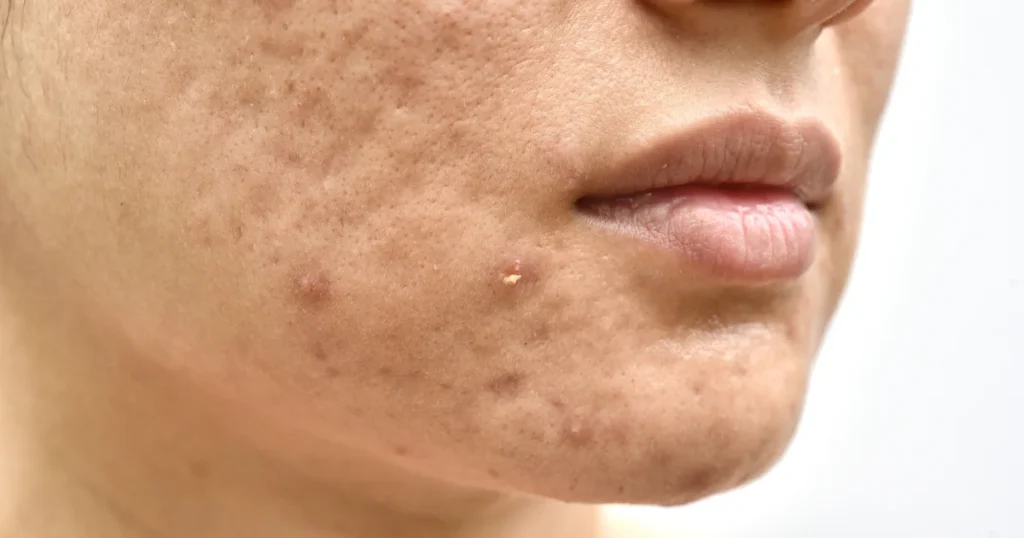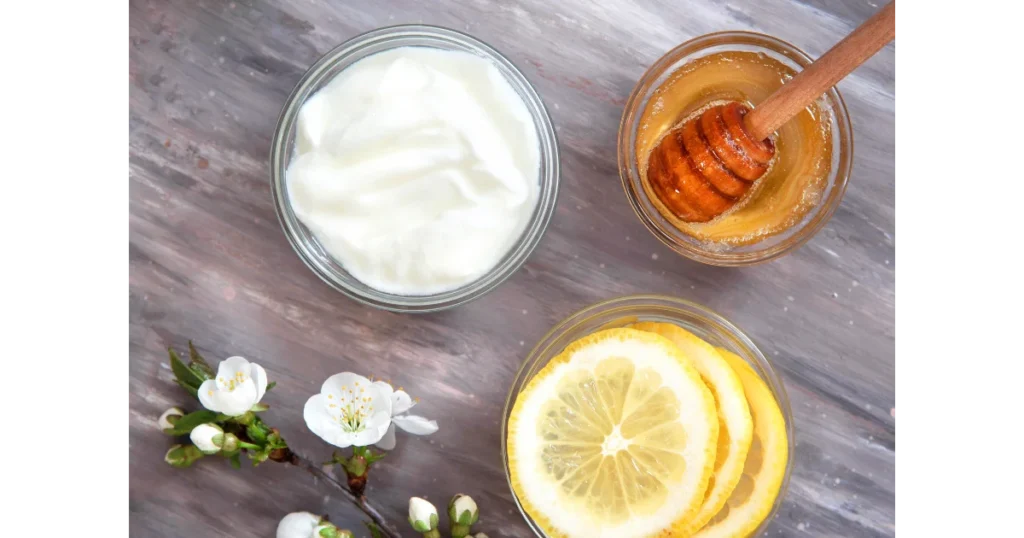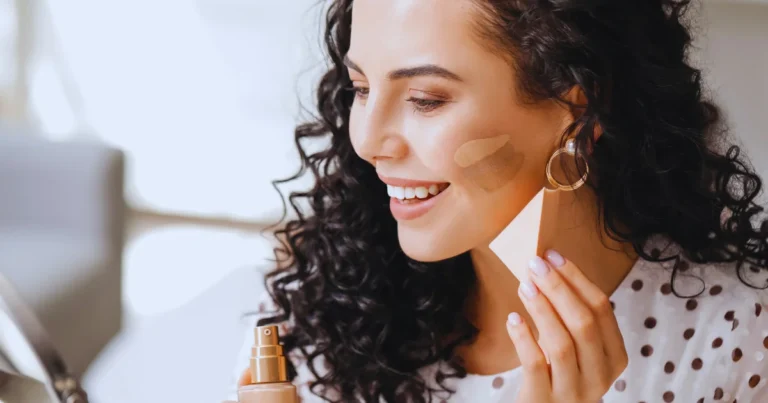Natural Remedies for Acne Scars: Harnessing Clear Skin Naturally
Acne scars result from inflammation within the dermal layer of the skin when acne lesions heal. This process can lead to various types of scars and can significantly impact one’s self-esteem and confidence.
While there are various treatments available, many individuals seek natural remedies for their gentleness and minimal side effects.

What is Acne Scars?
Acne scars are lasting reminders of past breakouts, and comprehending their types and underlying causes is essential for effective treatment. Acne scars typically result from the skin’s inflammatory response to acne lesions, where the healing process leads to alterations in the skin’s structure and texture.
Related: How to choose right moisturizer according to your skin type.
Types of Acne Scars:
1. Atrophic Scars:
Atrophic scars are characterized by depressions or indentations in the skin’s surface. These scars are further classified into:
- Icepick scars: Deep, narrow scars that resemble small puncture marks on the skin.
- Boxcar scars: Broad, box-like depressions with defined edges.
- Rolling scars: Wide depressions with a rolling or undulating appearance.
2. Hypertrophic Scars:
Hypertrophic scars are raised, thickened scars that develop when the body produces excess collagen during the healing process. Unlike keloid scars, which extend beyond the original injury site, hypertrophic scars remain confined to the area of the original acne lesion.
3. Pigmented Scars:
Pigmented scars, also known as post-inflammatory hyperpigmentation (PIH), occur when melanin production increases in response to inflammation. These scars manifest as areas of increased pigmentation that can range from pink, red, or purple to brown or black, depending on skin tone.
Causes of Acne Scars:
- Inflammation due to excess oil, dead skin cells, and bacteria.
- Delayed or Inadequate Treatment of acne lesions.
- Genetics
- Skin Type
- Severity of Acne
Natural Remedies for Acne Scars:
1. Aloe Vera:
Aloe vera soothing properties make it a popular choice for treating acne scars. Its anti-inflammatory effects can help reduce redness and inflammation associated with acne scars.
The application of aloe vera gel significantly improved acne scars’ appearance after eight weeks of regular use according to the “Journal of Dermatological Treatment“.
Apply pure aloe vera gel directly to the affected areas and leave it on for 30 minutes before rinsing off with water.
2. Apple Cider Vinegar:
Apple cider vinegar contains acetic acid, which has exfoliating properties that can help fade acne scars and improve skin tone.
Dilute apple cider vinegar with water in a 1:3 ratio (one part vinegar to three parts water). Apply the diluted solution to the scars using a cotton ball and leave it on for 5-10 minutes before rinsing off with water.
Use caution when using apple cider vinegar, as it can cause irritation if not properly diluted.
3. Honey:
Honey is renowned for its antibacterial and moisturizing properties, making it an excellent remedy for acne scars.
Research published in the “Journal of Cosmetic Dermatology” suggests that honey has wound-healing properties and can aid in scar reduction.
Apply raw honey to the scars and leave it on for 10-15 minutes before rinsing off with lukewarm water.

4. Lemon Juice:
Lemon juice contains natural bleaching properties that can help lighten acne scars and hyperpigmentation.
The application of lemon juice effectively reduced post-inflammatory hyperpigmentation in acne scars, study in “Indian Journal of Dermatology” .
Dilute freshly squeezed lemon juice with equal parts water to avoid skin irritation and apply the mixture to the scars using a cotton ball. Leave it on for 10-15 minutes before rinsing off.
5. Green Tea Extract:
Green tea is rich in antioxidants called catechins, which have anti-inflammatory and skin-soothing properties.
Brew green tea and allow it to cool completely. Then, apply the cooled tea to the scars using a cotton ball or spritz it onto the skin. Leave it on for 10-15 minutes before rinsing off with water.
Regular application of green tea extract can help reduce inflammation and improve the appearance of acne scars over time.
6. Coconut Oil:
Coconut oil is rich in fatty acids and antioxidants that promote skin regeneration and repair.
A review published in the “International Journal of Molecular Sciences” highlights coconut oil’s potential as a natural emollient and its ability to improve skin barrier function.
Massage a small amount of organic coconut oil onto the affected areas in gentle, circular motions. Regular application can help improve the appearance of acne scars over time.
7. Tea Tree Oil:
Tea tree oil possesses powerful antimicrobial properties that can help prevent acne breakouts and reduce the appearance of scars.
It can effectively treat acne with fewer side effects compared to conventional medications, Research in the “Australasian Journal of Dermatology“.
Mix a few drops of tea tree oil with a carrier oil such as jojoba or almond oil and apply the mixture to the scars using a cotton swab. Leave it on overnight for best results.
8. Rosehip Seed Oil:
Rich in vitamins A and C, as well as essential fatty acids, rosehip seed oil can promote skin regeneration and repair.
A study published in the “Journal of Cosmetics, Dermatological Sciences and Applications” found that rosehip seed oil improved skin elasticity and hydration while reducing the appearance of scars.
Gently massage a few drops of rosehip seed oil onto the scars twice daily for optimal results.
9. Turmeric:
Turmeric possesses anti-inflammatory and antioxidant properties that can help reduce inflammation and fade acne scars.
Research published in the “Phytotherapy Research” suggests that curcumin, the active compound in turmeric, can inhibit excess melanin production and lighten hyperpigmented scars.
Create a paste by mixing turmeric powder with water or honey and apply it to the scars. Leave it on for 10-15 minutes before rinsing off with water.
Precautionary Measures:
- Patch Test: Before using any new natural remedy for acne scars, it’s essential to perform a patch test on a small area of skin to check for any allergic reactions or irritation.
- Dilution: Some natural remedies, such as lemon juice or apple cider vinegar, may need to be diluted to avoid skin irritation. Follow recommended dilution ratios and avoid applying undiluted solutions directly to the skin.
- Sun Protection: Certain natural remedies, like citrus-based ingredients or exfoliating agents, can increase skin sensitivity to sunlight. Always apply sunscreen with a high SPF when using these remedies, and minimize sun exposure to prevent further skin damage.
- Consistency: Consistent use of natural remedies is key to seeing results. Establish a skincare routine and stick to it, applying the chosen remedies as directed for optimal effectiveness.
- Discontinue Use if Irritation Occurs: If you experience any redness, itching, or irritation after using a natural remedy, discontinue use immediately and rinse the affected area with water. Consult a dermatologist if irritation persists or worsens.
Consultation with a Dermatologist:
If you have severe or persistent acne scars, or if you’re unsure about which natural remedies are suitable for your skin type, consult a dermatologist for personalized recommendations and guidance. Remember that everyone’s skin reacts differently, so it’s crucial to listen to your skin’s needs and adjust your skincare routine accordingly.
At Glance:
Acne scars can be distressing, but natural remedies offer gentle yet effective solutions for improving their appearance. As with any skincare regimen, consistency is key, and it’s essential to perform a patch test before using any new product to avoid potential irritation or allergic reactions.






